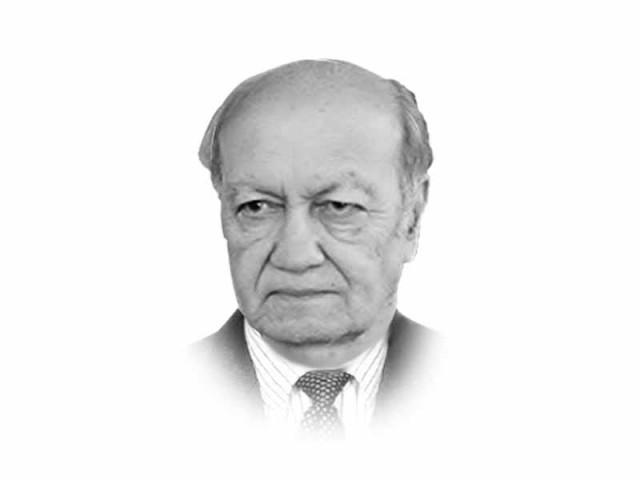Reversing the national slide
Political leaders fail to recognise that their responses in adversity reflect their character and leadership qualities

The writer is a retired lieutenant general of the Pakistan Army and a former federal secretary. He has also served as chairman of the Pakistan Ordnance Factories Board
Nawaz Sharif and his immediate family may have genuine grievances regarding certain flaws in the court judgment and the cases instituted against them. This has led Nawaz to adopt a confrontational posture against the state institutions. Shehbaz Sharif and Chaudhry Nisar would like a more conciliatory approach. Hopefully, at this point better sense would prevail on all sides and there is less acrimony in current rhetoric by those who matter in shaping the nation’s destiny. One only hopes that Nawaz’s focus remains more on fighting the court cases legally and less politically so that the affairs of the state, which are already seized with serious issues, are not compromised.
Moreover, Nawaz’s efforts to run the government through remote control and retain a hold over the party through legislative manoeuvering could backfire. His own political party could be its first casualty if differences start emerging from within. It could also deplete the party’s vote bank, as voters get disillusioned. A glimpse of which was evident from the relatively narrow margin victory in the NA-120 by-election.
What our political leaders fail to recognise that their responses in adversity reflect their character and leadership qualities. People are closely watching how Nawaz and other national leaders, including Imran Khan, conduct themselves before the judiciary and the National Accountability Bureau (NAB). Nawaz is playing a martyr and Imran is dismissive and critical of NAB. People see that all they care is to preserve their self at the expense of compromising national interests and show scant respect for national institutions.
The most disturbing aspect of the present situation is the near absence or focus on major national issues by the political parties. The PML-N is fighting a battle for preservation, the PPP is busy promoting Bilawal, while the PTI is engaged in its pursuit to grab power by accusing Nawaz and Zardari of being the embodiment of corruption and the MQM is a victim of its leadership crisis. The entire national dialogue centres around these themes.
Major issues concerning foreign policy and national security are dealt primarily by the military and this tradition is getting further entrenched. Sincere efforts by the Senate chairman to revive the flagging interest in national issues have been given a cold shoulder. The media is more active in raising alarm about the state of the economy than the government or the opposition. The burgeoning fiscal deficit and the inability to increase exports are debated more outside than inside parliament and the people are seldom taken into confidence on economic issues.
It is indeed the resilience of its hardworking people and a dynamic private sector that is a source of inspiration and keeping the state afloat. But this ‘muddling through’ is not good enough. And even for that to be sustained under extreme internal and external pressure can become problematic.
Pragmatism demands that the leadership take serious stock of the nation’s state of economic, political, security and social challenges. Leaders need to think also beyond forthcoming elections. As the electorate gets wiser there would be better chances of those political parties coming into power that give greater weightage to real issues and truly care for them than play on slogans.
There are serious problems that afflict the country. We cannot just wish away the rising population bulge or the looming threat of water scarcity in the coming decades that Pakistani and international professionals have been repeatedly drawing attention to.
According to demographic experts, Pakistan is poised to soon become the fifth-most populous country, which has far-reaching political, social and economic consequences. Similarly, our water economy is running dry and the country is water stressed with hardly any effort to counter the challenge. On such vital issues our politicians are silent, betraying their lopsided sense of priorities. It is the responsibility of the government, political and civil society leaders to raise awareness, but is any political leader or party addressing the issue?
Similarly, the neglect of education has serious consequences. Nearly 50 per cent of our population is not literate and the quality of education reflects gross neglect of national priorities. Although there is irrefutable evidence that education, especially of women has direct bearing on health and education of future generations. Special emphasis has therefore to be placed on female education. Prioritising education would also take care of the growing population by making them useful citizens of the state. Instead of being a burden these educated youth could be employed productively within the country or be able to find employment abroad and contribute to the national economy through remittances and acquiring valuable experience.
It is the unanimous view of experts that our education system is overdue for a major overhaul. The syllabi need to be revised to be compatible with contemporary requirements. High priority should be accorded to science and engineering subjects to meet the challenges of the 21st century.
For all this to happen we need disciplined and dedicated leadership. If this wish were to turn into reality merit will have to replace hereditary politics. To discourage family-related politics, political parties will have to inculcate democratic practices within parties. Poor leadership turns off the spirit of the people and makes it even more difficult to steer the country through a host of challenges.
Published in The Express Tribune, October 25th, 2017.
Like Opinion & Editorial on Facebook, follow @ETOpEd on Twitter to receive all updates on all our daily pieces.















COMMENTS
Comments are moderated and generally will be posted if they are on-topic and not abusive.
For more information, please see our Comments FAQ